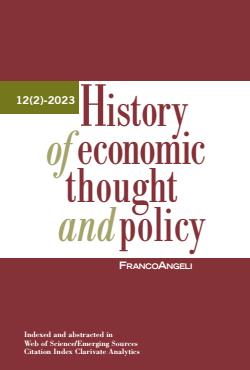
LIBRI DI FABIO MASINI
La ricerca ha estratto dal catalogo 22 titoli


The paper reconstructs the debates in the USA about economic theorizing and policymaking advisory concerning a multi-layered system of governments. Beyond apparent similarities, it highlights the ontological divides between Ostrom-Tiebout- Warren on polycentric governance and Buchanan on competitive federalism on the one side, and Musgrave’s and Olson’s fiscal federalism. It further underlines how such divides - concerning the relative role of individuals, markets, collective author- ities, and social order - echoed similar debates in Europe related to a multi-layered economic system, again depending mostly on different ontological assumptions.
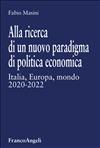
Italia, Europa, mondo 2020-2022
Un racconto serrato delle vicende dell’integrazione europea negli ultimi tre anni – connotati da tre crisi (pandemia, guerra, inflazione) –, attraverso le lenti di un economista impegnato a divulgare le proprie competenze al grande pubblico. Un esperimento fallito, secondo l’Autore, ma che ci restituisce con straordinaria lucidità il clima di crescenti aspettative, improvvise disillusioni, nuove speranze; dal quale provare a immaginare l’idea di Europa che nei prossimi anni si verrà costruendo.
cod. 1820.348
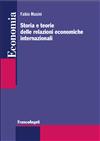
Un libro ambizioso e necessariamente imperfetto, il tentativo “impossibile” di ricostruire la storia delle relazioni economiche internazionali all’interno del quadro teorico di riferimento, dal Settecento ai giorni nostri, raccontando l’intreccio fra eventi, teorie economiche e scelte politiche.
cod. 367.104

Gli economisti italiani e l'adesione al sistema monetario europeo
cod. 363.48

In the 1950s Pierre Uri played a significant role in shaping the European eco-nomic order. Thanks to his prominent contributions to the team of advisers that centred around Jean Monnet, both the ECSC and the EEC Treaties were designed to encompass the potential to evolve into a federal constitution for Europe. The paper aims to highlight the role of Pierre Uri in drafting the main features of the institutional, decision-making, and fiscal architecture of early European economic integration.

The dominant narrative describes Tommaso Padoa-Schioppa as a rather in-transigent, austerity-biased, market-preserving money doctor. He certainly was a leading actor in macro-prudential financial supervision, both at the national and supranational level. His personal engagement in many and diverse supervisory or-ganizations testifies of his idea that financial regulation and stability are a crucial stabilizing feature in a highly unstable and interdependent world. Guiding expecta-tions among market agents and providing a credible framework of financial rules is key to both stability and growth. This paper explores the connection between his contributions to financial supervision and the issue of an evolving and unfinished (thus particularly fragile) European integration project, challenging the idea that he was a radical market supporter.
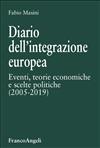
Eventi, teorie economiche e scelte politiche (2005-2019)
Mentre le piazze di tutto il mondo si riempiono di giovani che chiedono soluzioni globali a problemi globali, le decisioni collettive rimangono ostaggio dei governi nazionali. Quanto si sta allargando il divario fra la politica, nella sua dimensione unicamente nazionale, e i cittadini, coi loro bisogni condivisi e le molteplici identità collettive? Questo diario vuole offrire uno sguardo sui tanti fallimenti che si sono succeduti nei processi d’integrazione europea e internazionale degli ultimi quindici anni. Per capire, insieme, dove vogliamo andare. E come non farci portare altrove.
cod. 1820.328

In the late 1980s and early 1990s a process was started that would lead to the single currency in Europe. The choice made for its governance relied on an intergovernmental monitoring over convergence, based on the strict compliance to the Maastricht criteria. The White Paper of the Delors’s Commission on Growth, Competitiveness, Employment was issued in September 1993 to face the new internal and external threats to the European economies. It provided a framework for policy-action that should accompany the building of the euro and help the European economy survive the challenges of globalization, sustainability and new ICTs. The paper aims to examine the White Paper of 1993, and to analyse the reasons why it was neglected and eventually set aside by the member States, thus weakening the long-term prospects of the European economy and the sustainability of the forthcoming European single currency.

Italian policy-making changed dramatically during the Seventies. Exogenous events (like the end of the Bretton Woods system and the oil shocks) and endogenous transformations of the major economic (wage indexation, planning system, instrument of governmental intervention in industries, tax system, relationship between monetary authority and Treasury) and political institutions (workers statute, public health insurance, role of regions, school system) deeply changed the Italian society. Such changes were accompanied and often guided by experts, who exerted a major influence on policymaking. This influence mainly operated through some influential think tanks, which set the table for fundamental public policies. Among them, one of the most relevant was CESPE, the research centre of the Italian Communist Party, to which most leading Italian economists of the time gave their contribution, and that organized several workshops and published research and policy papers. The aim of the paper is to highlight the contribution CESPE gave to the transformation of Italian policy-making in the Seventies.


Facts, theories, and policies can be considered as the vertices of a triangle. While many contributions explore along the edges of such triangle, between couples of poles, we claim that the history of economics thought is fundamentally interested in looking within the whole area of the triangle. The relationship among theories, public choices, and events is complex, often twodirectional, with some unforeseeable short circuits. In order to tackle such complexity, it is necessary to use an interpretative model that assumes a high degree of interdependence between such variables and focuses on the evolution of their mutual interactions over time. The paper aims to show that this is the approach that the works presented in this issue of the journal try to address and illustrates some of their key features, in particular country-specificity and ideological bias.

The first 1947 meeting of the Mont Pelerin Society is considered the date of birth of neoliberalism. But the neoliberal thought after WWII is the result of fervent intellectual efforts in the previous decades. The paper aims at highlighting the role of Luigi Einaudi to the making of the neoliberal project, enquiring into the intellectual foundations of his thought on the institutions of international liberalism.

In 1989, the Delors Report pushed the accelerator on European economic and monetary integration, setting the calendar for a three-steps process aiming at a single currency. The British Government tried to hinder this goal, casting into the scientific debate and political negotiations alternative plans, first based on currency competition, later on the issuance of a parallel currency (the "hard-ecu" proposal). The aim of this work is to reconstruct the theoretical framework in which such debates took place in Britain, both at a scientific level and in the political arena
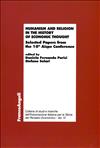
Selected Papers from the 10th Aispe Conference
Humanism and religion have been two reference points for economists who expressed their perplexities on the conception of man and society adopted in mainstream economics. This volume contains a selection of twenty papers presented at the X conference of the Italian Association for the Study of Economic Thought. The theme of the conference was Humanism and Religion in the History of Economic Thought.
cod. 363.81
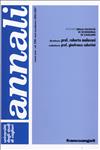
Nuova serie. Vol. XXIII, anno accademico 2006/2007
Il XXIII volume degli Annali della Facoltà di Economia dell’Università di Cagliari raccoglie, tra i vari titoli: “Is Management of Mutual Funds in Italy really active? An Empirical Investigation”; “Some Note about the Existence and Stability of Periodic solutions in non linear three-dimensional Economic Financial Models”; “Egemonia e soluzione del problema distributivo nei sistemi economici capitalistici a decisioni decentrate”; “Testing for asymmetric degrees of price stickiness within the Italian industrial sector”...
cod. 1820.173
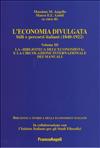
Stili e percorsi italiani (1840-1922). Vol. III - La "Biblioteca dell'economista" e la circolazione internazionale dei manuali
Il primo studio sistematico sulla «Biblioteca dell’economista», una collana editoriale che, con i suoi 71 tomi contenenti più di 150 classici della scienza economica, divenne uno strumento unico di aggiornamento e di divulgazione delle idee economiche nel panorama internazionale. Il volume offre inoltre studi sulle traduzioni di manuali stranieri non incluse nella «Biblioteca», sull’apertura internazionale della manualistica italiana e sulla sua diffusione e ricezione all’estero.
cod. 1820.162



Percorsi intorno al caso italiano
cod. 363.58